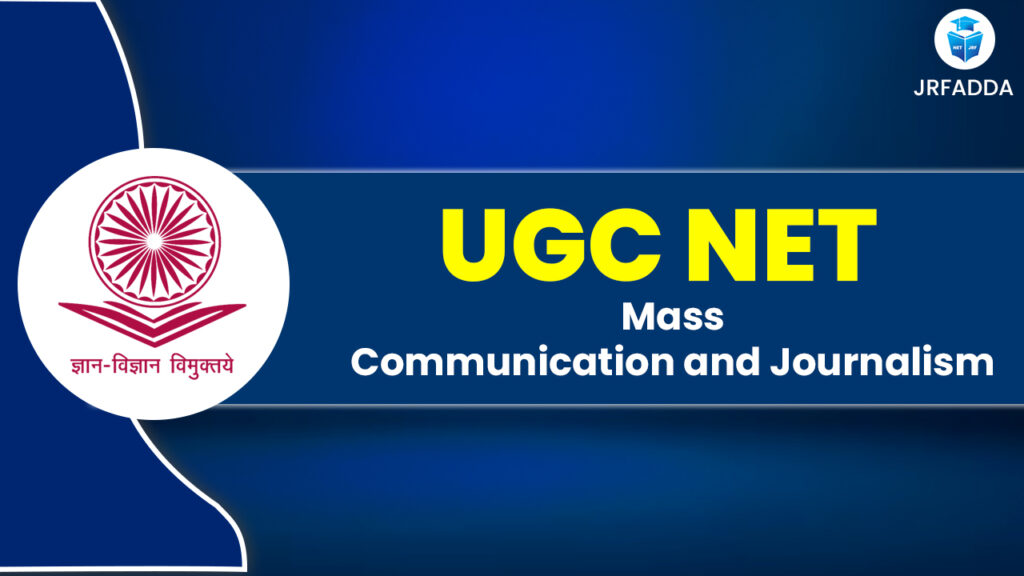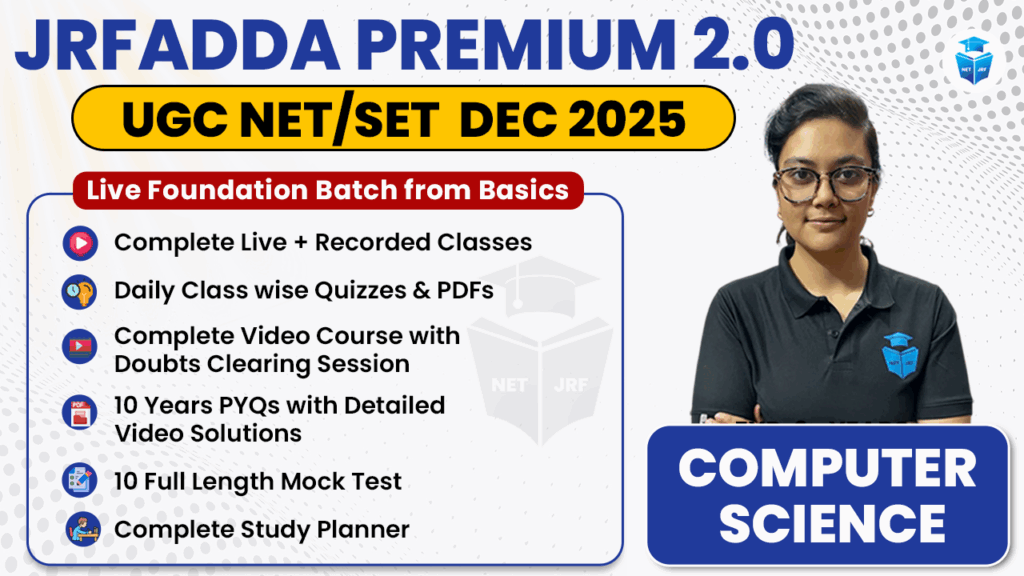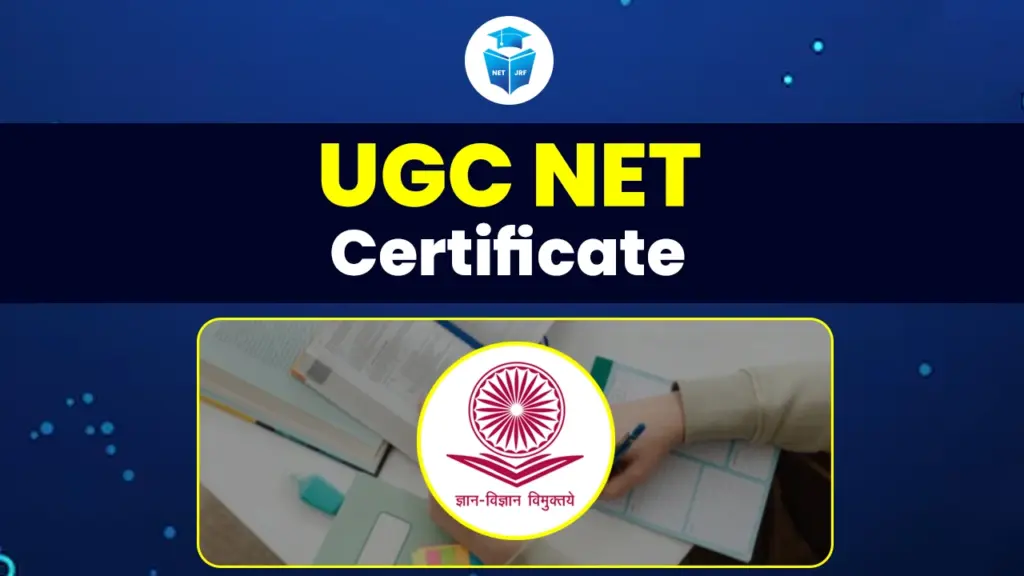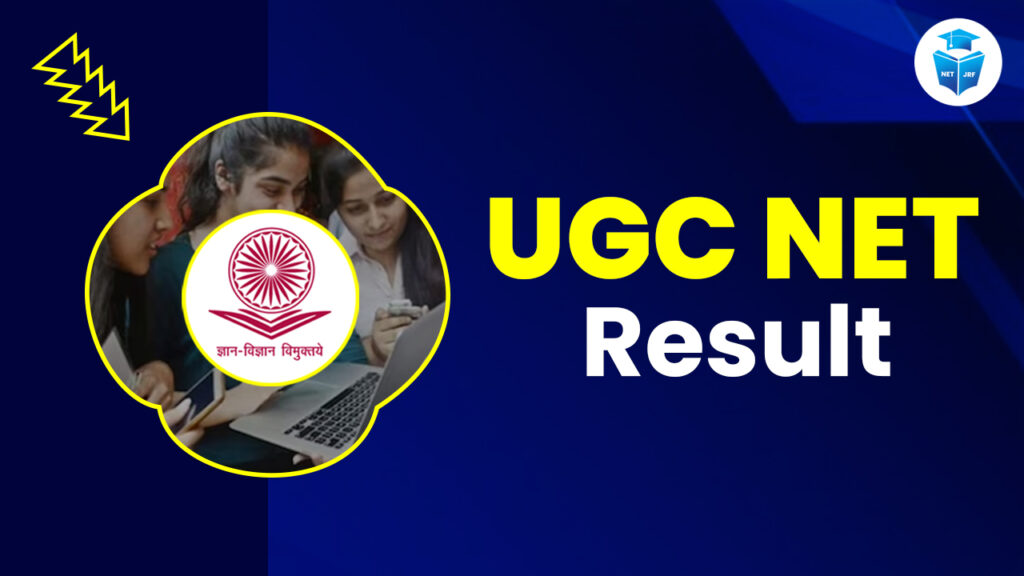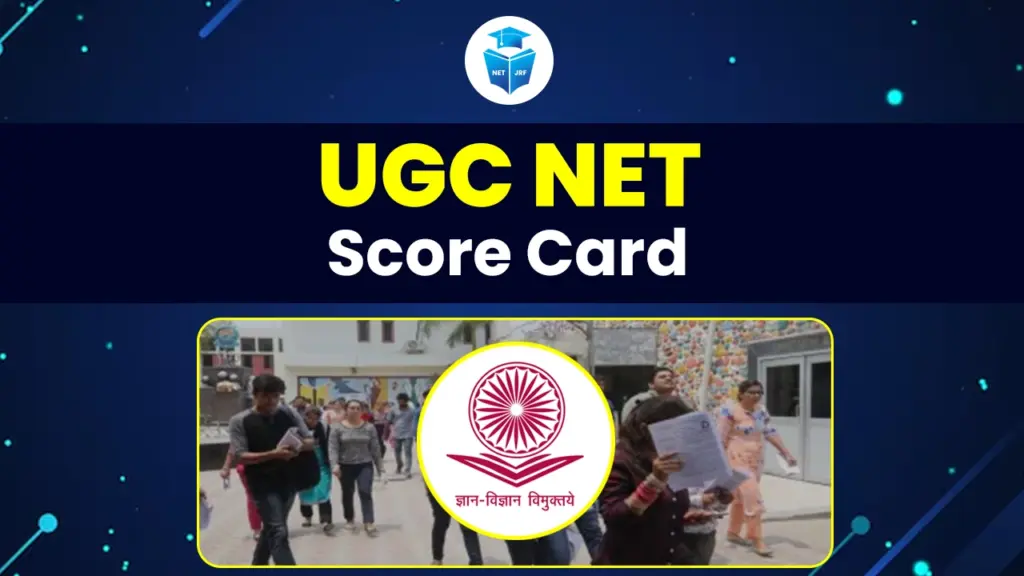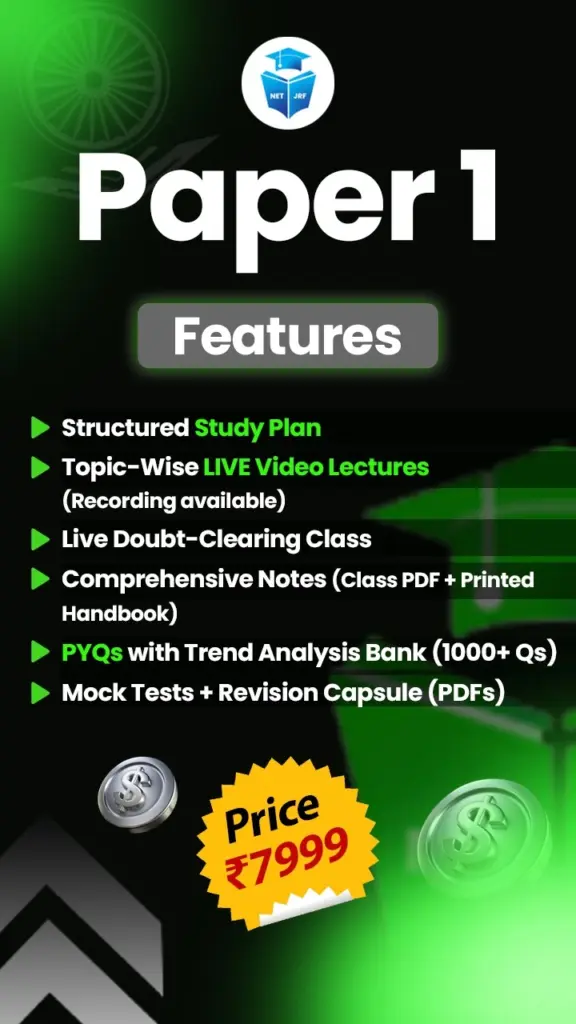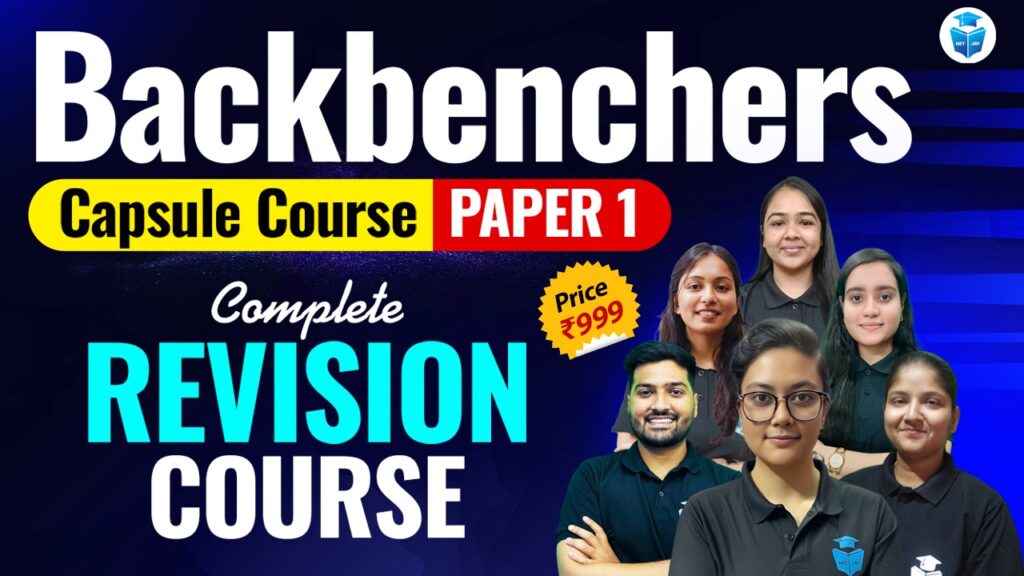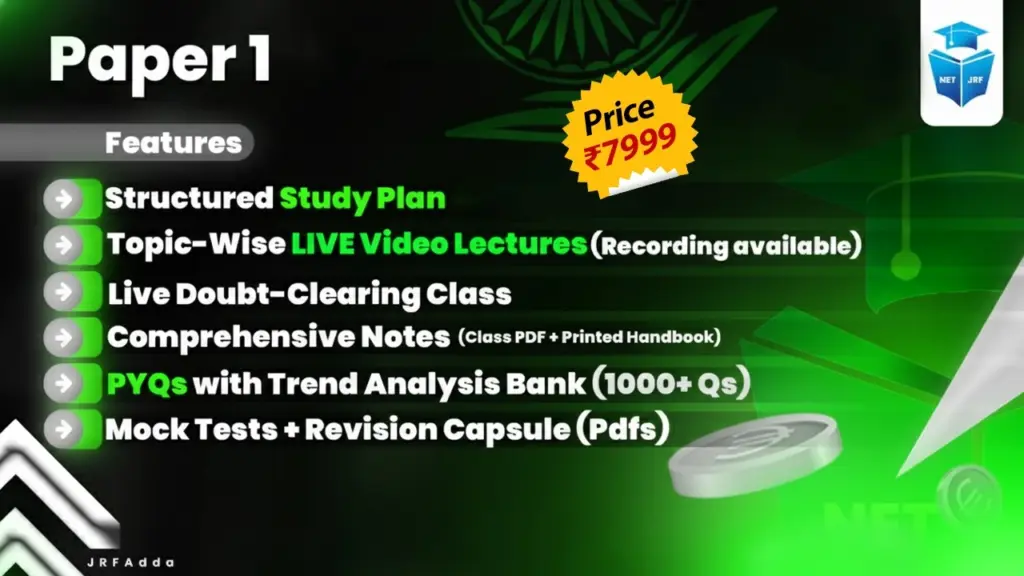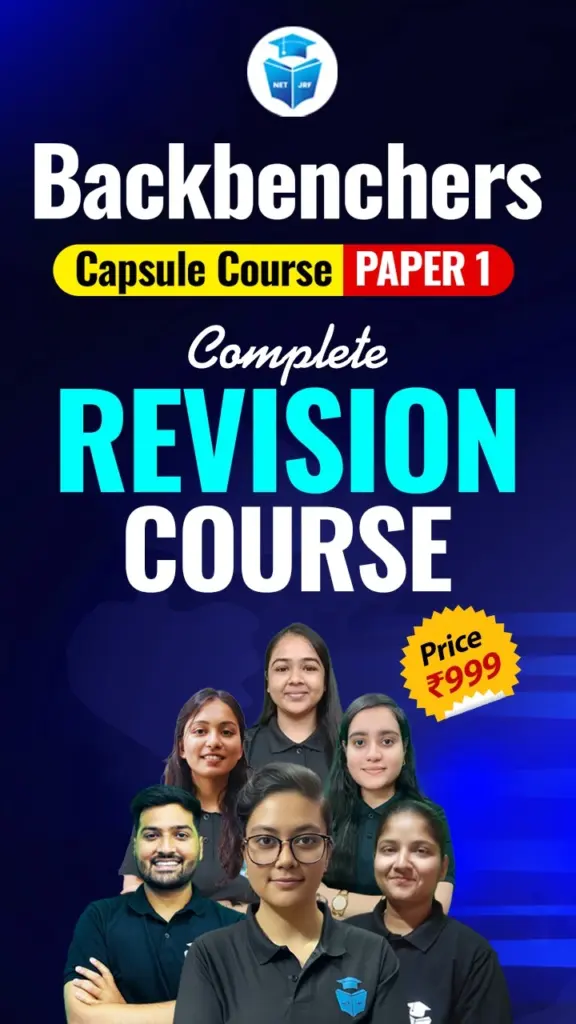UGC NET Mass Communication and Journalism 2025 exam is a perfect opportunity for candidates aiming to pursue Assistant Professor or Junior Research Fellowship (JRF) in the field of mass communication and journalism. This national qualification exam is conducted by the National Testing Agency (NTA) all across India. The tentative dates for the UGC NET December 2025 session have been released, and the exam was conducted on 6 January 2026 in shift 2.
This article provides complete information about the UGC NET Mass Communication and Journalism 2025 exam—its structure, syllabus, eligibility, study material, previous year papers PDFs and career scope.
Also Read: UGC NET Exam 2026
What is UGC NET Mass Communication and Journalism?
The UGC NET in Mass Communication and Journalism tests a candidate’s academic understanding of journalism, media operations, public communication, and research aptitude. This subject is ideal for those who wish to:
- Become lecturers or professors in media or journalism departments
- Pursue M.Phil. or Ph.D. in communication studies with UGC JRF funding
- Contribute to policy-making or research in media organizations or think tanks
It encompasses traditional print and broadcast media, the rise of digital journalism, and socio-political implications of mass communication in India and beyond.
UGC NET Mass Communication and Journalism 2025 Key Features
Here are some of the main features of the UGC NET Mass Communication and Journalism 2025 exam:
| Feature | Details |
| Conducting Body | National Testing Agency (NTA) |
| Exam Level | National |
| Eligibility | Master’s in Journalism/Media/Communication or related fields |
| Mode of Exam | Computer-Based Test (CBT) |
| Exam Frequency | Twice a year (June & December cycles) |
| Duration | 3 hours (No break between Paper I & II) |
| Total Questions | 150 (Paper I: 50, Paper II: 100) |
| Total Marks | 300 |
| Negative Marking | None |
| Medium | English & Hindi |
| Official Website | ugcnet.nta.nic.in |
Also Read: UGC NET Exam Date 2025
UGC NET Mass Communication and Journalism 2025 Eligibility Criteria
The eligibility criteria for the UGC NET Mass Communication and Journalism require:
Academic Qualification
Candidates must hold a Master’s degree in Mass Communication, Journalism, Media Studies, Communication, or related subjects from a UGC-recognized university.
Minimum Percentage
- General/EWS/OBC (Non-Creamy Layer): 55%
- SC/ST/PwD/Transgender: 50%
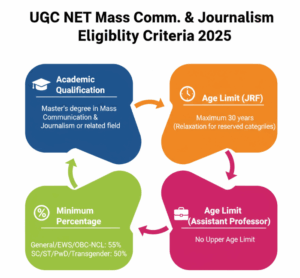
UGC NET Age Limit
- For JRF: Maximum 30 years (with relaxation for reserved categories)
- For Assistant Professor: No upper age limit
Also Read: UGC NET Eligibility 2026
UGC NET Mass Communication and Journalism 2025 Exam Pattern
It is important for the candidates to have complete knowledge of the exam pattern for the UGC NET Mass Communication and Journalism 2025 for Paper I and Paper II.
Paper I: General Teaching and Research Aptitude
The exam pattern for the UGC NET Mass Communication and Journalism 2025 Paper I is as follows:
- Questions: 50
- Marks: 100
- Topics: Teaching aptitude, research methodology, logical reasoning, communication, ICT, higher education system
Paper II: Mass Communication and Journalism (Subject-specific)
The exam pattern for Paper II of UGC NET Mass Communication and Journalism 2025 is as follows:
- Questions: 100
- Marks: 200
- Topics: Based on the official UGC NET syllabus
UGC NET Marking Scheme:
- +2 marks for each correct answer.
- No negative marking.
Also Read: UGC NET Exam Pattern 2026
UGC NET Mass Communication and Journalism 2025 Syllabus
Having a clear understanding of the syllabus is necessary for the UGC NET exam 2025 preparation. The candidates must download the UGC NET Mass Communication and Journalism Syllabus PDF and start preparing for the UGC NET December 2025 session:
Units Covered in Paper II UGC NET Mass Communication and Journalism
There are 10 units in total in Paper II of the UGC NET Mass Communication and Journalism 2025 syllabus. Each unit covers theoretical foundations, practical applications, historical context, and ethical standards in Indian and global contexts. The Paper II syllabus includes:
- Communication – Concepts, Models & Theories
- History of Journalism in India
- Media Laws and Ethics
- News Reporting and Editing
- Broadcast Journalism
- Advertising and Public Relations
- Digital Media and Online Journalism
- Media Management and Production
- Communication Research
- International Communication
UGC NET Mass Communication and Journalism 2025 syllabus PDF
Candidates can download the official UGC NET Mass Communication and Journalism syllabus PDF from the NTA website or from the link provided below.
UGC NET Mass Communication and Journalism Syllabus PDF Download
Also Read: UGC NET Syllabus 2026 for Paper 1 & 2
Books for UGC NET Mass Communication and Journalism 2025
Below is the list of some of the best books for UGC NET Mass Communication and Journalism 2025 preparation:
| Book Title | Author |
| Mass Communication in India | Keval J. Kumar |
| Media and Communication Research Methods | Arthur Asa Berger |
| Media Ethics | Paranjoy Guha Thakurta |
| Advertising and Promotion | Belch & Belch |
| Communication Theories | Denis McQuail |
Also Read: UGC NET Books 2025 for Paper 1 & 2
UGC NET Mass Communication and Journalism Previous Question Papers (2014-2025)
Practicing with the UGC NET Mass Communication and Journalism previous question papers is essential for understanding the exam pattern and commonly asked questions.
| Year | Download PDF |
| UGC NET Question Paper 2025 (December) | Available Soon |
| UGC NET Question Paper 2025 (June) | Download PDF |
| UGC NET Question Paper 2024 | Download PDF |
| UGC NET Question Paper 2023 | Download PDF |
| UGC NET Question Paper 2022 | Download PDF |
| UGC NET Question Paper 2019 | Download PDF |
| UGC NET Question Paper 2018 | Download PDF |
| UGC NET Question Paper 2014 | Download PDF |
Also Read: UGC NET Previous Year Question Papers
Career Scope After UGC NET Mass Communication and Journalism 2025
Qualifying the UGC NET Mass Communication and Journalism exam opens doors in academia and industry. Here are a few of the many career opportunities after UGC NET Mass Communication and Journalism:
Academic
- Assistant Professor in colleges/universities
- JRF-supported Ph.D. programs
- Research Associate positions
Media and Journalism
- News anchor, editor, reporter
- Content writer, digital journalist, video producer
PR and Advertising
- Campaign manager, PR officer, copywriter
Government and Policy
- Public Information Officer
- Consultant in government media divisions and NGOs
Also Read: Career Options after UGC NET 2025
Conclusion
The UGC NET Mass Communication and Journalism exam is a vital gateway for aspirants seeking careers in teaching, research, and the diverse fields of media and communication. Success in the UGC NET December 2025 exam demands a thorough grasp of the syllabus, consistent practice with previous year papers, and staying updated on contemporary media trends and ethical issues. Whether your goal is to become an academician, a researcher, or a media professional, diligent preparation combined with strategic study approaches will significantly boost your chances of qualifying.
UGC NET Mass Communication and Journalism FAQs
What is the minimum eligibility to appear in UGC NET Mass Communication and Journalism?
The candidate must have a master's degree in journalism, media, communication, or a related field with minimum qualifying marks.
Is the UGC NET Mass Communication and Journalism syllabus PDF available?
Yes, the syllabus is available on the official NTA website in PDF format and can be downloaded from the link provided in the article.
Are there UGC NET mock tests available for this subject?
Yes, the JRFAdda’s platform and NTA’s portal offer subject-specific mock tests.
Can I take UGC NET Mass Communication and Journalism 2025 in Hindi?
Yes, the exam is bilingual (Hindi and English), depending on your preference.
What are the career options after qualifying for the UGC NET Exam in this subject?
The career options after UGC NET Exam 2025 include- Academic (Assistant Professor), research (Ph.D./JRF), journalism, PR, advertising, media consulting, and government roles.

